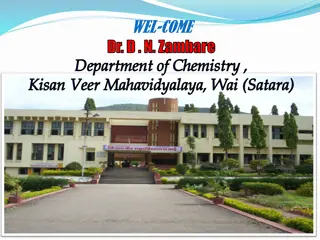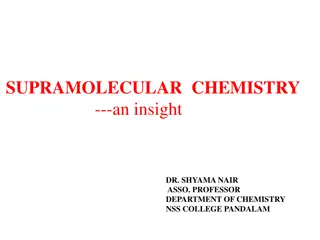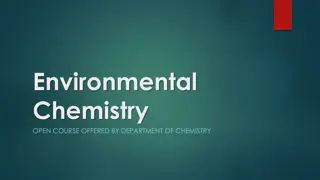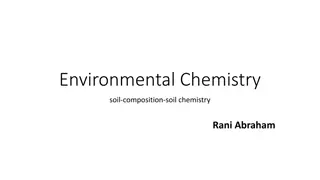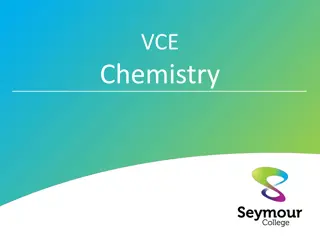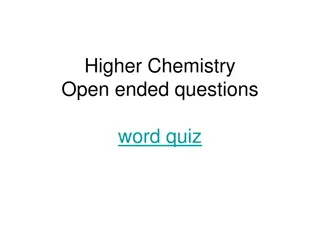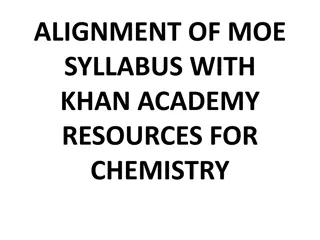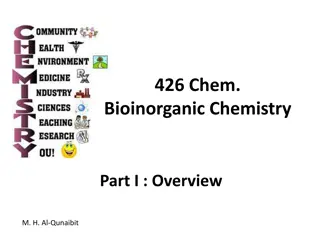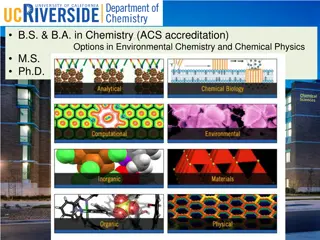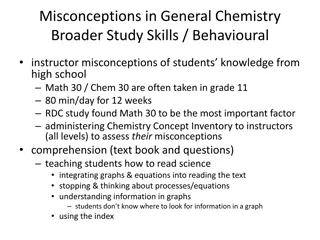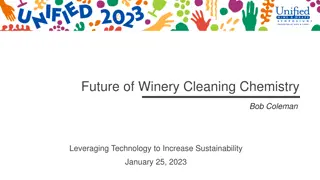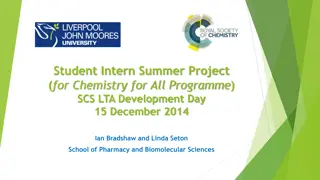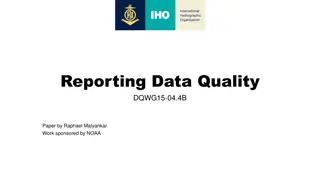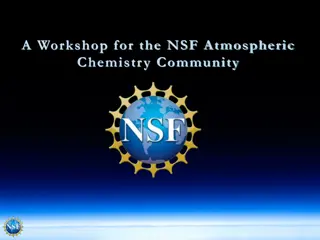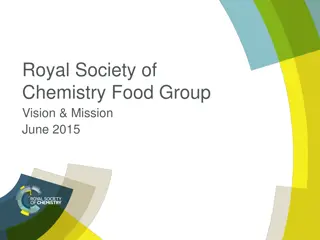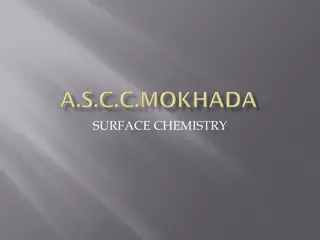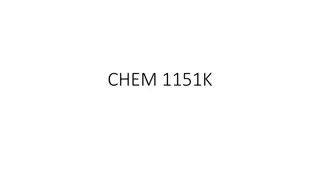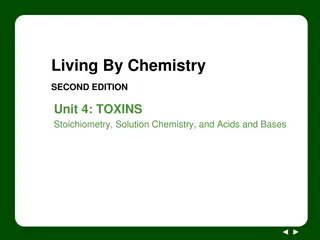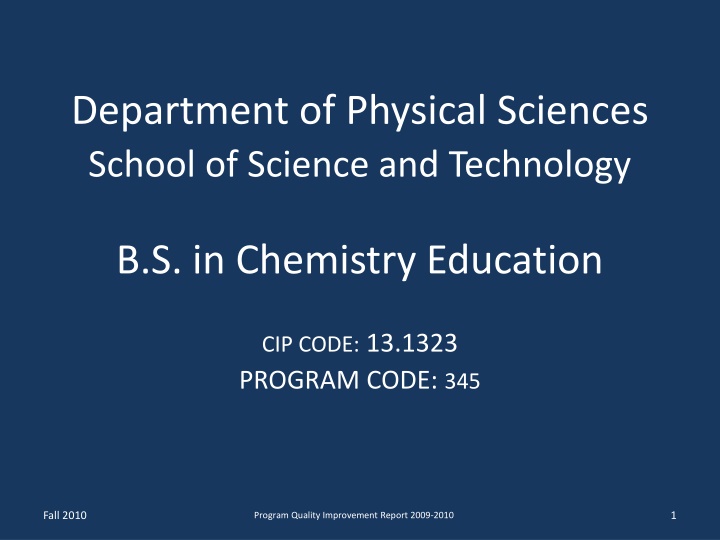
Chemistry Education Program Quality Report
The Department of Physical Sciences at the School of Science and Technology offers a B.S. in Chemistry Education program focused on student learning outcomes, accreditation standards, and teacher objectives in science education. The program emphasizes understanding of key concepts, research skills, safety practices, and community engagement.
Download Presentation

Please find below an Image/Link to download the presentation.
The content on the website is provided AS IS for your information and personal use only. It may not be sold, licensed, or shared on other websites without obtaining consent from the author. If you encounter any issues during the download, it is possible that the publisher has removed the file from their server.
You are allowed to download the files provided on this website for personal or commercial use, subject to the condition that they are used lawfully. All files are the property of their respective owners.
The content on the website is provided AS IS for your information and personal use only. It may not be sold, licensed, or shared on other websites without obtaining consent from the author.
E N D
Presentation Transcript
Department of Physical Sciences School of Science and Technology B.S. in Chemistry Education CIP CODE: 13.1323 PROGRAM CODE: 345 Fall 2010 1 Program Quality Improvement Report 2009-2010
Student-Learning Outcomes Standards mandated by an accreditation agency (NCATE/NSTA) Outcome 1: The chemistry education major understands the major concepts, principles, theories, laws, and interrelationships found in the discipline of chemistry and related fields. Outcome 2: The chemistry education major understands the major unifying concepts of science. Outcome 3: The chemistry education major understands important personal and technological applications of science. Outcome 4: The chemistry education major understands research and can successfully design, conduct, report evaluate investigations in science.
Outcome 5: The chemistry education majorunderstands the historical and cultural development of science and the evolution of knowledge in chemistry. Outcome 6: The chemistry education majorunderstands the philosophical tenets, assumptions, goals, and values that distinguish science from technology and from other ways of knowing the world. Outcome 7: The chemistry education majorunderstands the legal and ethical responsibilities in chemistry and in science, in general, regarding safety issues related to the proper treatment of animals; the maintenance and disposal of materials; knows and follows emergency procedures; knows how to maintains safety equipment; and knows safety procedures.
Program Goals and Objectives Objective 1: Teachers of science understand and can articulate the knowledge and practices of contemporary science. Objective 2: Teachers of science engage students effectively in studies of the history, philosophy, and practice of science. Objective 3: Teachers of science engage students both in studies of various methods of scientific inquiry and in active learning through scientific inquiry. Objective 4: Teachers of science recognize that informed citizens must be prepared to make decisions and take action on contemporary science- and technology-related issues of interest to the general society. Objective 5: Teachers of science plan and implement an active, coherent, and effective curriculum that is consistent with the goals and recommendations of the National Science Education Standards. 4
Objective 6: Teachers of science relate their discipline to their local and regional communities, involving stakeholders and using the individual, institutional, and natural resources of the community in their teaching. The candidate actively engages students in science- related studies or activities related to locally important issues. Objective 7: Teachers of science construct and use effective assessment strategies to determine that backgrounds and achievements of learners and facilitate their intellectual, social, and personal development. Objective 8: Teachers of science organize safe and effective learning environments that promote the success of students and the welfare of all living things. Objective 9: Teachers of science strive continuously to grow and change, personally and professionally, to meet the diverse needs of their students, school, community, and profession. They have a desire and disposition for growth and betterment.
Alignment of Outcomes Alignment with Cameron University Mission: Foster a student-centered academic environment that combines innovative classroom teaching with experiential learning . Prepare students for professional success, responsible citizenship, life- long learning, and meaningful contributions to a rapidly changing world . Alignment with School of Science and Technology Mission Educate students based on excellence in academic work and exposure to latest technological advances . Provide students the skills and confidence to excel as lifelong learners . Ensure success of graduates in a diverse and ever-changing environment . 6
Alignment of Outcomes Alignment with Physical Sciences Department Mission Provide a rigorous basic education in chemistry and physics both in theory and practice at various levels appropriate for students to prepare to become professionals in their selected fields of study as a major in chemistry Provide an education in chemistry and physics appropriate for students preparing for various careers, e.g., teaching science in secondary schools and health care. Relationship with Cameron University Plan 2013 (Goal One): Highest quality in instruction, research, and service to better meet the needs of the citizens of the region. Effective assessment of student learning . University and programmatic accreditation. Efficient, effective course delivery in multiple formats. Student/faculty opportunities to demonstrate scholarship in regional and national forums.
The Principal Program Objective To prepare reflective, well-prepared science teachers in science, particularly in the chemistry discipline. To accomplish the objective, chemistry education majors referred to as candidates (candidates for licensure in the State of Oklahoma as a science teacher) must complete a series of transition points which follow those of the Education Unit.
Assessment Data Eight assessments are used as evidence demonstrating that the candidate is meeting the most current National Science Teachers Association standards. For each assessment used in the chemistry education program, the type of the assessment and the time it is administered is identified below. The eight assessments align with the chemistry education s specific objectives: content knowledge, pedagogical knowledge, and professional knowledge. Content knowledge relates to subject area content, the ways of science through investigation and research, and the disposition of liability and safety.
DIRECT MEASURES OF STUDENT-LEARNING: 1a) Content Knowledge State Licensure Tests Oklahoma Subject Area Tests (OSAT) in Chemistry, Physics, Physical Science, Earth Science 1b)Content Knowledge Standardized Exams American Chemical Society (ACS) standardized first-year chemistry examination 1c)Content Knowledge Grades (Courses aligned with NSTA competencies) Completion of chemistry course sequence (i.e. general chemistry)
2a) Pedagogical and Professional Knowledge and Skills Science Integrated Lesson Plan - Inquiry Nature of Science Classroom/Laboratory Safety and Liability Research Design Cultural/Historical Relationships to Science 2b) Pedagogical and Professional Knowledge and Skills Student Teaching Assessment (Rubric) - Part 3 Student Teaching Evaluation EDUC 4965/4975
3a) Effects on Student Learning Teacher Work Sample
IN-DIRECT MEASURES OF STUDENT-LEARNING: 1) Program Entry-Points (defined by the Education Unit) 2) Exit Interview (defined by Department) 3) OGET (general education mean scores)
Action From Previous Priority Outcomes 1. The chemistry education majorcan successfully design, conduct, report, and evaluate investigations in science. The chemistry education majorunderstands the historical and cultural development of science and the evolution of knowledge in chemistry. The chemistry education majorunderstands the philosophical tenets, assumptions, goals, and values that distinguish science from technology and from other ways of knowing the world (nature of science). 2. 3.
Action From Previous Priority Outcomes Measurements Of Student Learning or Service Outcomes Program Outcome Curriculum Area Measurements Validation Reliability Schedule Procedures Procedures Research Design CHEM 4772 or Special Problems Nature of Science CHEM 4772 Historical or Cultural Development of Science CHEM 4772
State Mandated Licensure Test (OSAT) Chemical Education Assessment Data Spring 2007 Fall 2007 Fall 2008 Fall 2009 Cameron University Mean State Score Mean Student Score
Comprehensive Grade Analysis Courses Knowledge & Content # of students assessed % students complete C or better General Chemistry 2 100 General Biology 1 0 0 100 General Physics Earth Science
Standardized Chemistry Exams (ACS) Chemical Education Assessment Data Spring 2007 Fall 2007 Fall 2008 Fall 2009 Fall 2010 Cameron University Mean N/A National Score Mean 35 + 11 Student Score 39
Science Integrated Lesson Plan Inquiry Strategy Assessment Module Chemical Education Assessment Data Spring 2007 Fall 2007 Fall 2008 Fall 2009 Fall 2010 Cameron University Mean N/A National Score Mean N/A Student Score N/A
Nature of Science Assessment Module Chemical Education Assessment Data Spring 2007 Fall 2007 Fall 2008 Fall 2009 Fall 2010 Cameron University Mean N/A National Score Mean N/A Student Score N/A
Liability and Laboratory Safety Assessment Module Chemical Education Assessment Data Spring 2007 Fall 2007 Fall 2008 Fall 2009 Fall 2010 Cameron University Mean N/A National Score Mean N/A Student Score N/A
Research Design Assessment Module Chemical Education Assessment Data Spring 2007 Fall 2007 Fall 2008 Fall 2009 Fall 2010 Cameron University Mean N/A National Score Mean N/A Student Score N/A
Historical/Cultural Development of Science Assessment Module Chemical Education Assessment Data Spring 2007 Fall 2007 Fall 2008 Fall 2009 Fall 2010 Cameron University Mean N/A National Score Mean N/A Student Score N/A
Student Teaching Assessment (Part 3 Rubric Evaluation) Chemical Education Assessment Data Spring 2007 Fall 2007 Fall 2008 Fall 2009 Fall 2010 Cameron University Mean N/A National Score Mean N/A Student Score N/A
Teacher Work Sample Teacher- Student Interaction Assessment Module Chemical Education Assessment Data Spring 2007 Fall 2007 Fall 2008 Fall 2009 Fall 2010 Cameron University Mean N/A National Score Mean N/A Student Score N/A
Analysis of Assessment Data A significant amount of data is being collected this semester; however, we only have two students in the program at this time. The data will be limited. We, at this time, do not have enough data to evaluate the program.
Action Plan for Outcomes We are currently collecting initial data to determine outcomes so we can plan for the future.
Ancillary Actions No actions at this time.
Graduate Information We have no graduates at this time.

